MercoPress. South Atlantic News Agency
Tag: José Mujica
-
Tuesday, May 31st 2011 - 08:43 UTC
Uruguay and Brazil pledge full support for Mercosur and Unasur
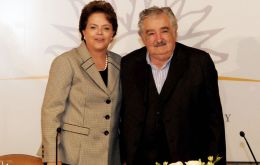
Uruguay and Brazil pledged Monday to continue strengthening the bilateral relation and regional integration through Mercosur and Unasur, after presidents Jose Mujica and Dilma Rousseff delegations signed fifteen cooperation agreements in Montevideo.
-
Monday, May 30th 2011 - 22:46 UTC
President Rousseff’s visit to Uruguay according to the Sao Paulo media

President Dilma Rousseff’s Monday visit to Uruguay will try to ease growing concerns in South America’s smallest country political and economic circles about “Brazil-dependency” and obstacles to bilateral trade, according to reports in the Sao Paulo media previous to her departure.
-
Monday, May 30th 2011 - 00:50 UTC
Rousseff visits Uruguay to sign 12 accords on trade, integration and technology
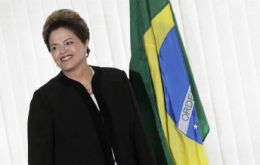
Brazilian president Dilma Rousseff arrives Monday in Uruguay, the third country she will be visiting after China and Argentina, since taking office last January first. The two countries are founding full members of Mercosur and Brazil is Uruguay’s main trade partner.
-
Thursday, May 26th 2011 - 16:10 UTC
Ban Ki Moon to visit Uruguay that will hold UN Human Rights Council presidency
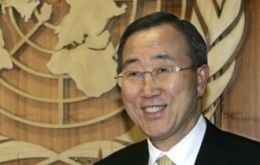
Uruguay will be holding next month the presidency of the UN Human Rights Council during 2011/2012 and for this motive UN Secretary General Ban Ki-moon is scheduled to visit Uruguay June 16th when he will be meeting President Jose Mujica and other top officials.
-
Wednesday, May 18th 2011 - 16:57 UTC
European Parliament stresses ‘desirability’ of EU/Mercosur balanced trade agreement

Current trade negotiations between the European Union and Mercosur dominated the opening speeches at of Eurolat (Europe/Latin America Parliaments) Fifth Plenary Session which is taking place in Montevideo.
-
Wednesday, May 18th 2011 - 16:46 UTC
Argentina’s poor cousin? Not Uruguay

The following piece by Jude Webber writing for the Financial Times explains the different approach by the two neighboring countries to the windfall earnings of the commodities boom.
-
Tuesday, May 17th 2011 - 00:56 UTC
Support for Uruguay president drops to 41%, down from 75% when taking office
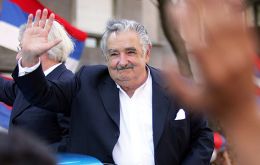
Support for Uruguayan president Jose Mujica dropped to 41%, nine percentage points less than last March and 34 points down from when he took office in March 2010, according to an Interconsult public opinion poll published Monday in one of Montevideo’s dailies.
-
Monday, May 16th 2011 - 06:38 UTC
Major setback for President Mujica and for the Uruguayan ruling coalition
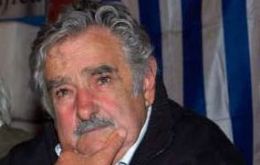
The administration of Uruguayan president Jose Mujica suffered a major setback over the weekend and could experience a further showdown on Thursday when members of the ruling coalition vote in Parliament the annulment of an Amnesty or Crimes expiration law which impedes the investigation of human rights violations committed during the country’s military dictatorship (1973/1985).
-
Tuesday, May 3rd 2011 - 08:22 UTC
Uruguay: overturning amnesty law could cost ruling coalition ‘dearly’

Uruguayan Vice-president Danilo Astori acknowledged that overturning the “Expired Crimes” or amnesty bill for human rights violators during the military dictatorship (1973/1985) could cost the ruling coalition ‘dearly’ and said he voted following ‘party discipline’.
-
Wednesday, April 27th 2011 - 02:10 UTC
Guerrilla/military events from forty years back poison Uruguayan politics
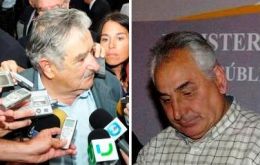
The release of an alleged unfinished pact negotiated over a decade ago between former urban guerrillas and the military triggered serious controversy in Uruguay in the midst of a political debate to overrule a bill which exempts former officers from going to court for alleged human rights abuses during the military dictatorship (1093/1085).
